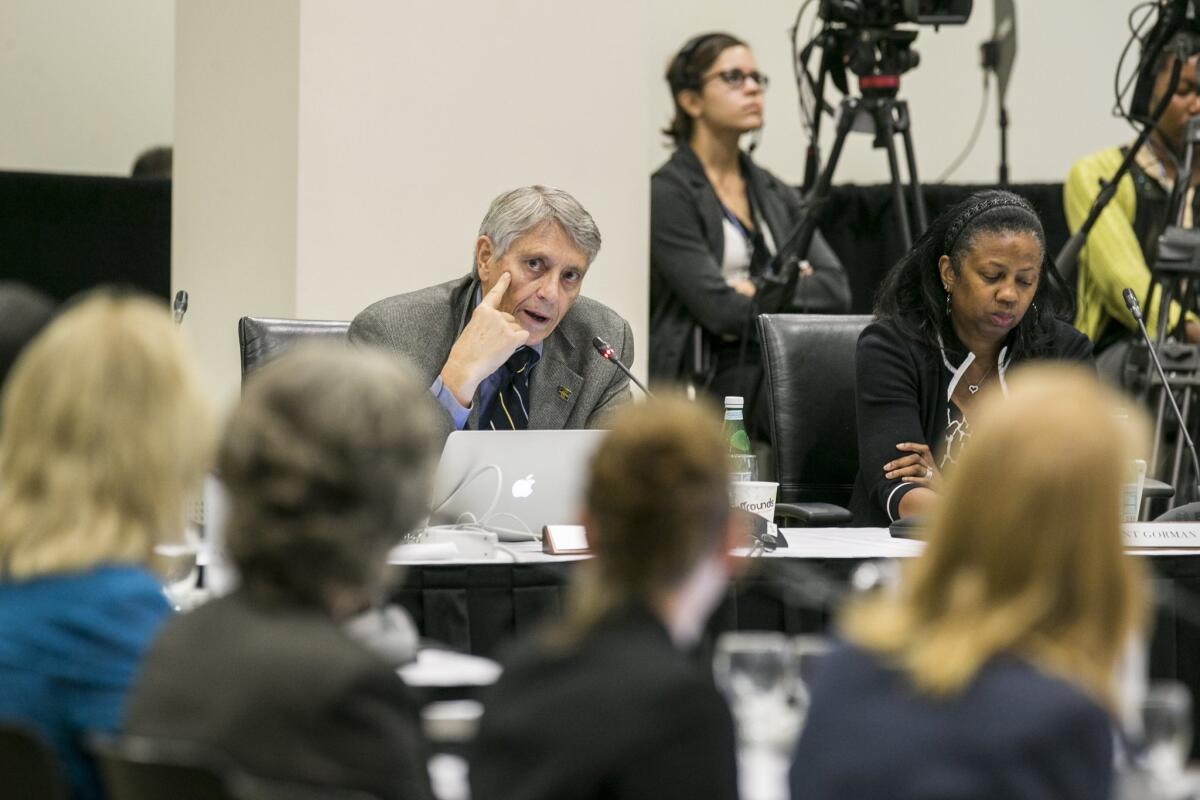Op-Ed: Microaggression, macro harm

Alumni Regents Rod Davis, left, and Yolanda Gorman address the University of California’s Board of Regents meeting to discuss a controversial policy statement on intolerance at UC Irvine on Sept. 17.
- Share via
If you live near a college campus or read anxious think pieces, you’ve probably heard about “microaggression.” A microaggression is a relatively minor insult to a member of a marginalized group, perceived as damaging to that person’s standing as a social equal. Examples listed on a blog called Oberlin Microaggressions include shopkeepers acting suspicious toward people of color, or someone saying to a Jewish student, “Since Hitler is dead, you don’t have to worry about being killed by him anymore.” A microaggression is not necessarily a deliberate insult, and any one instance might be an honest mistake. But over time a pattern of microaggression can cause macro harm by continuously reminding members of marginalized groups of their precarious position.
A recent paper by sociologists Bradley Campbell and Jason Manning claims that talk of microaggression signals the appearance of a new moral culture, a “culture of victimhood.” In the paper, Campbell and Manning present a history of Western morality.
The new culture of victimhood is not new, and it is not about victimhood.
First there was a “culture of honor,” which prized physical bravery. Insults demanded an aggressive reply. Picture two medieval knights glowering at each other, swords drawn.
Then the culture of honor was displaced by a “culture of dignity,” in which individuals let minor insults slide and reported more serious offenses to impartial authorities. Picture a 1950s businessman telling the constable about a neighbor peeking in windows.
Finally, there is an emerging “culture of victimhood,” in which individuals publicly call attention to insults in the hope of rallying support from others and inducing the authorities to act. Picture a Latina student tweeting about her professor’s racist comments.
There is a serious problem with Campbell and Manning’s moral history, and exposing it helps us see that the culture of victimhood label is misleading. Their history is a history of the dominant moral culture: It describes the mores of those social groups with the greatest access to power. Think about the culture of honor and notice how limited it must have been. If you were a woman in medieval Europe, you were not expected or permitted to respond to insults with aggression. Even if you were a lower-class man, you certainly would not have drawn your sword in response to an insult from a superior.
Now think about the culture of dignity, which Campbell and Manning claim “existed perhaps in its purest form among respectable people in the homogenous towns of mid-20th century America.” Another thing that existed among the “respectable people” in those towns was approval of racial segregation; “homogenous towns” did not arise by accident.
People of color, women, gay people, immigrants: none could rely on the authorities to respond fairly to reports of mistreatment.
The cultures of honor and dignity left many types of people with no recognized way of responding to moral mistreatment. But they did not stay quiet. What they did instead was quietly call one another to witness. They offered mutual recognition amid injustices they could not overcome. And sometimes, when the circumstances were right, they made sure that their mistreatment would be widely seen by organizing sit-ins and hunger strikes.
The new culture of victimhood is not new, and it is not about victimhood. It is a culture of solidarity, and it has always been with us, an underground moral culture of the disempowered. In the culture of solidarity, individuals who cannot enforce their honor or dignity instead make claim on recognition of their simple humanity. They publicize mistreatment not because they enjoy the status of victim but because they need the support of others to remain strong, and because public discomfort is the only possible route to redress.
Of course, until recently, marginalized people were reliant on word of mouth or the rare sympathetic journalist to document their suffering. Now they have social media. So we read on Twitter about dozens of offenses, some that seem incredibly small, even petty. It’s probably a bad idea to obsess too much over the details of any one microaggression; there will be some honest mistakes. But over time, social media allows us to see the pattern as a whole.
Granted, there are some serious concerns with the microaggression reporting trend. In a recent cover story in the Atlantic, free-speech advocate Greg Lukianoff and psychologist Jonathan Haidt suggested that talk of microaggression corrodes public discourse; it encourages accusations and counter-accusations rather than critical thinking.
This is a reasonable point, but their solution — that “students should also be taught how to live in a world full of potential offenses” — is not reasonable. The world is not static; what is taught to students now will help create the culture of the future.
It is not an accident that popular support for marriage equality was achieved about 15 years after gay-straight alliances became commonplace in American high schools and colleges. Teaching students that they must accept racist and sexist abuse, even in micro units, is simply a recipe for allowing racist and sexist abuse to continue.
The culture of solidarity is ancient, but crowd-sourced documentation is only a few years old. We are still learning how to focus on the pattern rather than the instance, and how to delicately report an offense when blame is ambiguous. All of this will take time. There will be mistakes. But the goal is worth it: A culture in which no one is denied full moral recognition.
Regina Rini is an assistant professor of bioethics at New York University.
Follow the Opinion section on Twitter @latimesopinion and Facebook
More to Read
A cure for the common opinion
Get thought-provoking perspectives with our weekly newsletter.
You may occasionally receive promotional content from the Los Angeles Times.









